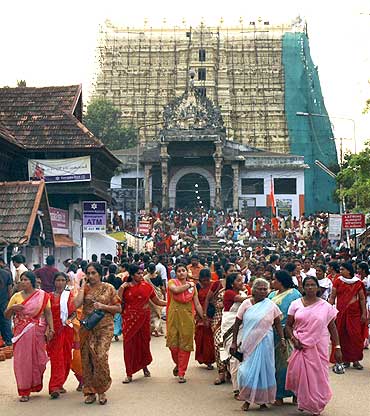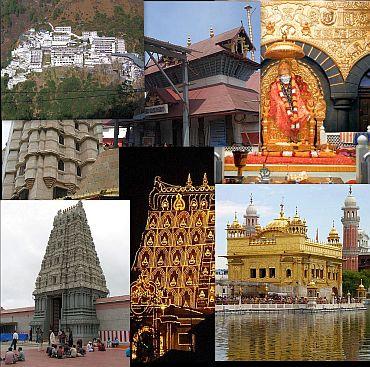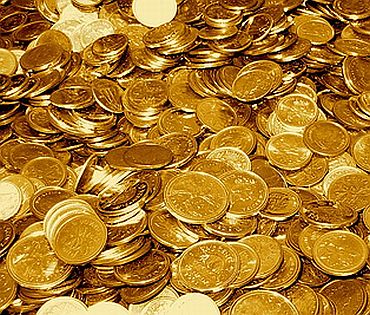Questions and speculations continue to haunt the Rs 90,000 crore treasure found in the secret cellars of the Sri Padmanabhaswamy Temple in Thiruvananthapuram.
Dr Mohanan Pillai, a professor at the Centre for Development Studies at Thiruvananthapuram, has been tracking this story since it hit the headlines.
In a candid chat with rediff.com's Vicky Nanjappa, he separates facts from fiction as he discusses the various theories about the origin and eventual fate of the wealth.
"The wealth in the temple coffers must be seen in the light of Kerala's politics and religion in the past. This wealth has been preserved for centuries and now an inventory is being taken. This kind of wealth is available in other religious institutions. I often wonder why this particular case is being sensationalised.
'The issue needs a political agreement'
Image: Some of the richest temples in India"There is a debate over what needs to be done with this wealth. Unfortunately, India has no specific guideline on how this wealth should be dealt with. Some have suggested that this wealth should be used for greater public good. But the moment this wealth is touched, it may blow up into a major political controversy.
"According to me, some portion of the wealth should be kept in the temple. There are ornaments which are used for day to day ceremonies and they are used every year.
"The remaining part of the wealth has an antique value attached to it. This party should be kept in a museum, which should be set up by the temple trust in consultation with the government. It is important that we get to see our national treasure and also ensure that our forthcoming generations also get a chance to experience the same. Such a museum can attract a lot of visitors and this would help the finances of the temple.
"About the debate on the coins found in the treasure, I feel that the issue needs a political agreement. The trust and the government could discuss whether these coins can be transformed for the economic development of the state. But this is not an easy issue in the absence of guidelines and a major consensus is needed.
'The wealth was not hidden'
"Another debate is raging on about the origin of this wealth. Some claim that the king of Travancore had not given any of it to the temple but instead hidden the wealth.
"As per the Travancore annexure, some wealth had been confiscated by the king. Other records show that this wealth was generated through pepper trade and collection of taxes. A considerable portion of the wealth was donated by the temple's devotees as an offering to the deity.
"I would not buy the argument that the Maharaja of Travancore had hidden this wealth in the temples. In fact, we must appreciate the fact that he had not spent this wealth and has saved it for future generations. In fact, during the annexation of Indian states, the maharaja had insisted that the temple be kept under private control.
"This indicates that the wealth was not hidden but given to the temple. Unlike the rest of the temples in Kerala, which are under the Devasom board, this one is under the jurisdiction of a trust. No member of the king's family can stake a claim over this wealth as it is the property of the temple.
"A record in the palace of Travancore states these facts and also information about how the wealth had been accumulated. This record must be made public so that all confusion and queries regarding the treasure are sorted out".




article